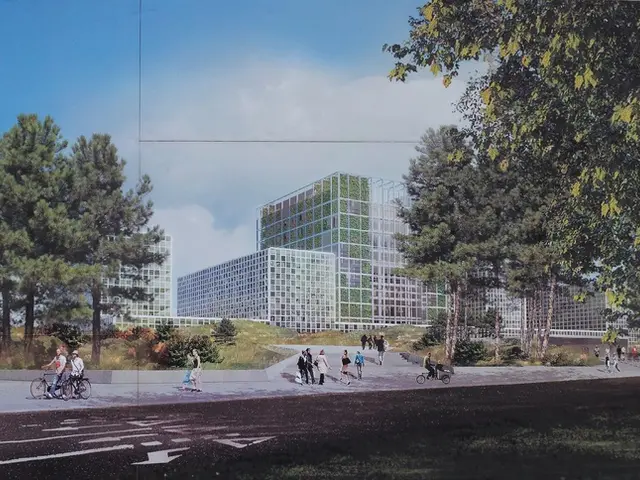A Hip Guide to Climate Change and Policy
Impact of Climate Change on Policy-Making: The Symbiosis of Scientific Data and Political Decisions
Climate change ain't no joke - it's a hot topic that's causing a storm in one of the most important parties around: Mother Nature's! It's affecting everything from caring for our health to hangin' onto our food security and, more importantly, keeping our economies stable. But don't despair, my friend - there's a healthy dose of science and politics mixin' it up to help us navigate these shifting weather patterns.
So, grab a cuppa joe and let's dive right in.
Rollin' With the Scientists
These brainiacs are unsung heroes of the climate change game. They're the ones hookin' us up with the solid data we need to understand thescore. One of their coolest crews is the Intergovernmental Panel on Climate Change (IPCC) - they're the all-star team that drops the latest findings, impacts, and potential solutions for us to chew on. Reports like the Sixth Assessment highlight just how urgent it is to take action, but they also give us powerful evidence to back up our policy-makin' moves.
But the scientists don't just hand us the info and walk away - hookin' up with politicians to make sure science is at the forefront of policy conversations is crucial. By keepin' science in the driver's seat, we can make sure we're headin' towards sustainable solutions that address both immediate and distant climate challenges.
Politicking with Climate Change
Climate change ain't just an environmental issue anymore - it's knockin' on the doors of every discussion we have, from energy to transportation, agriculture to urban planning. Policymakers face the challenge of integratin' scientific research into solid, robust frameworks that can handle the risks thrown our way by climate change.
It's a balancing act 'cause the world of climate change is complex and ever-changing, with tons of things goin' on that don't always align with political interests and economic stability. Navigatin' partisan politics, lobbying from powerful corporations, and the fear of economic disruption can make takin' decisive action a real tear-jerkin' situation.
But party time doesn't stop here - checkin' out examples of climate policy initiatives from all over the globe lets us see what's possible when we put science to work for our planet.
Case Studies: The Party Never Ends
- Denmark's Green Wind energy transformation has resulted in approximately 47% of the country's electricity production comin' from wind power - scores of inspiration for those hopin' to transition to a sustainable energy future!
- The United States' Climate Policy Rollercoaster shows us how committed we can be in face of division and how global agreements can push us to make meaningful domestic changes.
- New Zealand's Carbon Pricing Mechanism offers insights into the power of economics in motivatin' industries to adopt sustainable practices.
- The European Union's Green Deal is an ambitious plan to address climate change and build a clean, fair, and resource-efficient economy by 2050.
Merging Local and Global Parties
When it comes to tackling climate change, it ain't just about global action - local action is the bedrock of global change. Grassroots movements empower communities to take the reins and demand action from their local governments. By workin' together across the world, we can create a chain reaction, with local initiatives leading the way to global change.
Public engagement is crucial to ensure the success of these local initiatives - when we get involved, we're more likely to support and stick to these policies. That empowerment helps us feel invested in the journey towards a sustainable future.
The Public and the Party
Believe it or not, how the public perceives climate change plays a huge role in shaping policies. When we're up-to-date on the facts, we're more likely to push our leaders to take action, and education initiatives can help us go from zombies to experts on climate change.
The media is a powerful tool in concertin' movement on climate change, so long as they do it right. Too much sensationalism or misinformation can confuse us and discourage action. On the flip side, solid reporting on the urgency of climate change and the science behind it can inspire us to push for meaningful policy changes.
The Future of the Party: Ready, Set, Adapt!
As the climate crisis continues to evolve, so must our approach to climate policies. Here are some hot trends to look out for:
- Climate Justice: Nah, we won't just be fightin' climate change - we'll be fightin' for justice too! We're startin' to recognize that sustainable solutions must address social inequality to be effective.
- Eco-Entrepreneurship: In our society, innovation drives the world, so we're keepin' our eyes on green businesses that create jobs, save the planet, and boost the economy.
- Integratin' Climate Risks into Security Policies: When we recollect that extreme weather events, resource scarcity, and population displacement challenge traditional notions of security, we realize that environmental stability is crucial for a stable world.
Bringin' the Scientists and Politicians Together
At the end of the day, it's all about bridgin' the gap between scientists and politicians to create positive, meaningful change. Scientists, who bring the evidence and data, and politicians, who create and implement policies, each gotta do their part to ensure we're takin' steps towards a sustainable, equitable future for all of us.
Remember, it's up to us to demand action and push our leaders to prioritize science in their policy decisions. Let's keep the conversation goin', spread the word, and create a collective movement that'll bring climate action to the top of the political agenda. Let's party like it's 2050!
- The urgency of climate change necessitates a balance between science and politics, ensuring that solid, sustainable solutions are developed to address both immediate and long-term climate challenges.
- The Intergovernmental Panel on Climate Change (IPCC) provides crucial scientific findings, impacts, and potential solutions to help guide policy-making efforts.
- Integrating scientific research into robust, flexible frameworks is essential for policymakers to navigate the complexities of climate change and address its various impacts on sectors like energy, transportation, agriculture, and urban planning.
- Local grassroots movements are instrumental in empowering communities to demand climate action from their local governments, fostering a chain reaction of change at the global level.
- Education initiatives play a key role in increasing public awareness and support for climate policies, empowering individuals to advocate for meaningful, science-based action.
- The media serves as a powerful tool in shaping public perception and driving action on climate change, demanding responsible reporting that focuses on data and evidence rather than sensationalism or misinformation.
- The future of climate policy will emphasize climate justice, eco-entrepreneurship, and the integration of climate risks into security policies as a means to address the interconnected global challenges posed by climate change. Collaboration between scientists and politicians is vital to ensuring a sustainable, equitable future for all.







